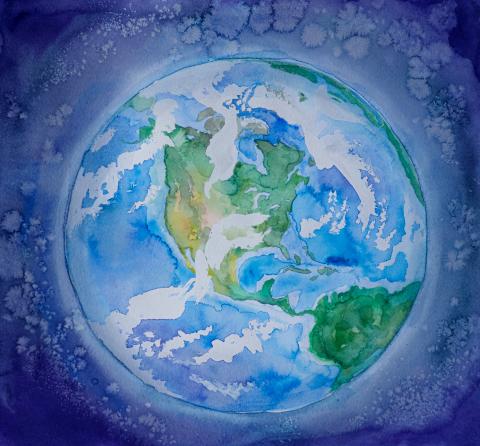
Fr. Frank Breen, MM, summarizes a major paper issued by the Maryknoll Fathers and Brothers calling on its members to listen to, identify with, and respond to the cry of the Earth and the cry of the poor. This article was published in the September-October 2021 issue of NewsNotes.
In June 2019, Pope Francis declared a global “climate emergency,” warning of the disastrous effects of global warming and stating that a failure to act quickly to reduce greenhouse gases would be a “brutal act of injustice towards the poor and future generations.” The Fourteenth General Chapter of the Maryknoll Fathers and Brothers unequivocally shares Pope Francis’ concern, affirming the scientific conclusion that climate change is real and presents an existential threat to all life on Earth.
Our Christian faith and our love for the poor compel us to respond to the cry of the Earth, its people, and its creatures. Ecological sin means ignoring our interconnectedness and interrelationship with the Earth, with fellow human beings and with future generations.
Our response must be immediate, because delay will add to the world’s suffering and make any remedies all the more difficult and must be both personal and communal. It must result in concrete action in and with the communities where we live and serve. Living and preaching an integral human ecology is the new face of contemporary mission. From now on, Maryknoll seeks to integrate the care of creation in all that we are and all that we do.
To truly hear the cry of the Earth and the cry of the poor we must open the doors of our hearts and minds and be willing to hear the painful moaning of Jesus on the Cross. “Jesus cried out in a loud voice, ‘Eli, Eli, lema sabachthani?’ (Which means ‘My God, my God, why have you forsaken me?’) As Christians, we are called to realize our oneness with the Suffering One – to identify with Christ, the poor, and all creation.
The details of climate change’s impact can be daunting. Diminished fresh water availability, coastal area flooding, and crop failures are but a few of the projections that scientists are noting. As global warming proceeds, ocean temperatures are rising, massive coral reefs are dying and fish populations are declining. Human communities dependent on the ocean for food sources will be left hungry. All across the world, we are witnessing heatwaves and extremely powerful storms and such climate extremes will intensify in years to come.
In connecting the cry of the Earth and the cry of the poor, Pope Francis presents an integral human ecology as the new face for contemporary mission, which recognizes that all creation is interrelated and that our good stewardship is a Christian imperative. We do not just inhabit the Earth, but we are of the Earth. When the earth suffers exploitation, we all ultimately suffer, but this is most evident in those who are impoverished and living on the margins of society. Our very existence and salvation depend on taking seriously our responsibility to promote integral ecology.
On May 24, 2020, Pope Francis declared the year of Laudato Si’. In an effort to galvanize concrete action by Church institutions, the Vatican launched a seven-year concrete action project with seven major goals: 1) response to the cry of the Earth; 2) response to the cry of the poor; 3) ecological economics; 4) the adoption of a simple lifestyle; 5) ecological education; 6) ecological spirituality; and 7) community commitment. This initiative is called the Laudato Si’ Action Platform and can be accessed at: www.LaudatoSiActionPlatform.org.
In this spirit of responding to Pope Francis’ call, the Maryknoll Chapter concluded with a long list of recommendations, including setting aside one percent of the Society’s annual budget designated for actions that combat climate change. Other recommendations include fossil fuel divestment, transitioning to fully electric or hybrid cars, eliminating use of single-use plastic items, and meeting through virtual means to reduce both road and air travel.
The Maryknoll Society should establish an advisory committee of Society Members and appropriate laity with scientific background, which can provide leadership at all levels with evaluations and recommendations based on the directions of Laudato Si’, facilitating the goal of directly linking the values of an integral human ecology with Maryknoll’s prime purpose of evangelization.
Maryknoll will conduct educational seminars for all its members, collaborate with religious and other organizations and actively participate in the Vatican’s long-range program of promoting Laudato Si’ as well as the United Nations’ Sustainable Development Goals, many of which intersect with an integral ecology.
Maryknoll Society members are also invited to live simple lifestyles, preach and teach about care of creation, and even become directly attuned to nature through gardening or another action. All should become familiar with updates from the Catholic Climate Covenant, the primary arm of the Catholic climate movement in the United States
Photo available via Unsplash.
